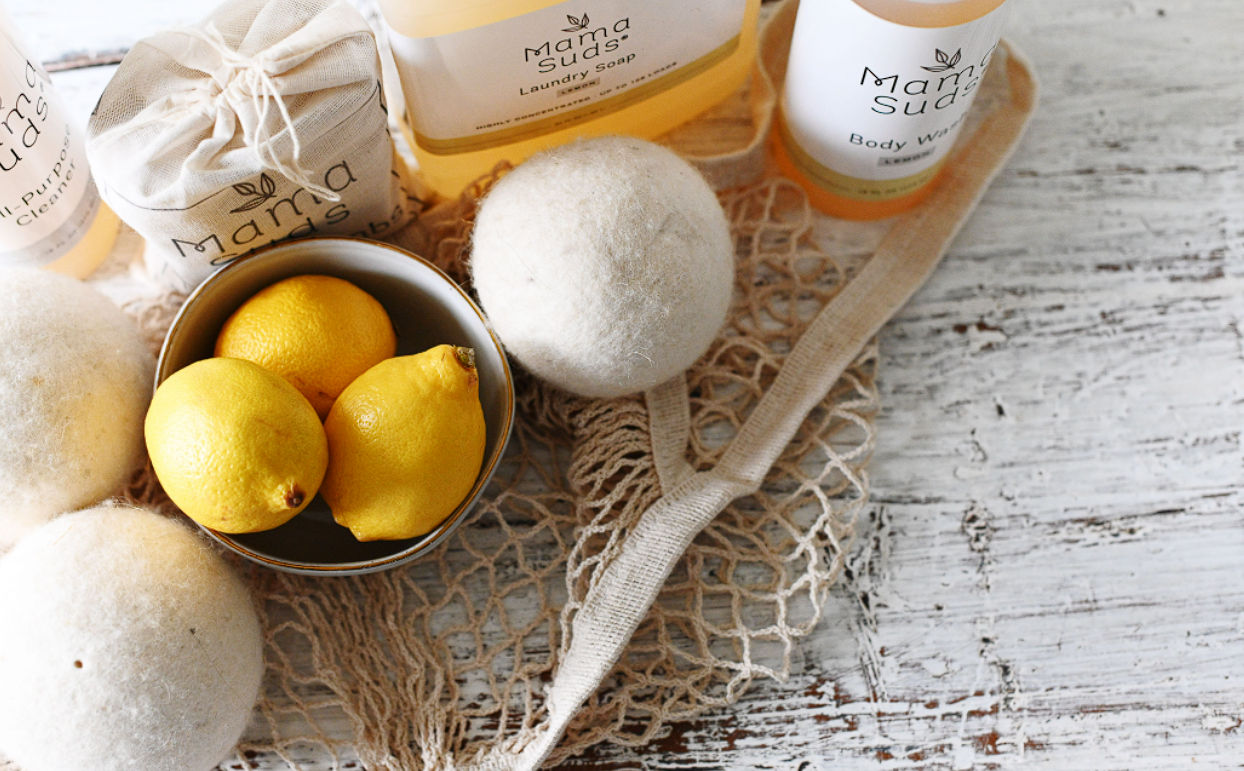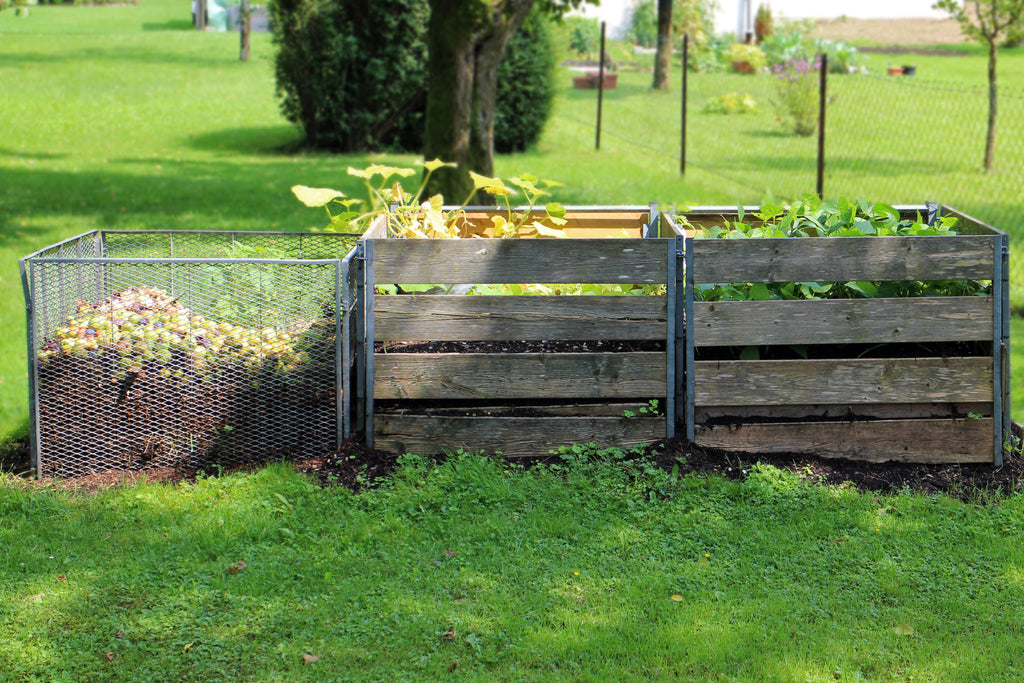
The CleanSuds Blog
Where education and truthful facts are easy to come by.

This Mama's Story: Lisa
This is a blog series highlighting the amazing women who are living examples of the MamaSuds Manifesto.



How to Create a Natural Homey Feeling Without Breaking the Bank
Maybe you’ve just moved into a new home, or you’re hoping to rearrange a well-loved space. You’re seeking a comfortable, homey feeling but you don’t want to spend a fortune, and you want to keep it natural. Luckily, there are several things that you can do to make sure that you stick to natural products, while still making sure your home feels welcoming.
Lighting
When decorating a space, consider where the lights are placed and the type of lightbulbs you are using. Many homes use incandescent light because they have a warm yellow light. But these light bulbs burn out fairly quickly compared to LED lights, and it takes more of them to light a space. Try replacing your incandescent lights with LED lights and placing them strategically around the room. You can use lampshades and other coverings to diffuse the light, giving the room a similar feeling to incandescent bulbs with much less expense.
Textiles
Area rugs, throw pillows, and blankets are easy ways to add color and texture to a space. These items are available in a wide range of colors, patterns, and designs to suit many different aesthetic styles. Even in a kitchen setting, adding a plush area rug to a high-traffic area can help to break up the space and add a homey feel. Living rooms and bedrooms are signature spots for adding cozy throws and pillows.
Fragrance
Our homes smell like a lot of different things. Sometimes, when we have been cooking or baking, that smell can be fantastic, but there are other times when you want the smell gone as fast as possible. Increasing air flow between rooms can help disperse smells, but you can also cover it up using a diffuser. Essential oils are a great natural way to disperse good smells throughout your home, without having to rely on the chemicals or artificial smells. Cinnamon and citrus oils are particularly popular for covering up unpleasant odors.
Wall Décor
Canvases, photographs, and tapestries are wonderful ways to add a homey feel to a space. You might plan out a color scheme that wall art helps to tie together, or you may let your personal preferences lead and simply select images, patterns, and colors that appeal to your intuitive side. Contrasting colors, like colors, and tone on tone art are all options for beautifying a space. If you have outer walls that tend to get cold during the winter, consider covering them with hangings or tapestries. Not only does this look great, but it also provides a little extra insulation.
There are a lot of things that you can do to make your home a little more like you, but it doesn’t have to break the bank, and you can still stay natural. Use these tips to create your ideal living space.
Home Cleaning Prep All Expecting Moms Should Complete
There is nothing quite as exciting (or as exhausting) as the last trimester of pregnancy. The baby is coming soon and there are so many tasks to do in those last few months to be ready for your baby's arrival. Even if you are adopting or making use of a surrogate, preparing your house for the changes a new child will bring seems almost overwhelming!
As you head into the last few months before your baby’s arrival, taking the time to prepare your home will help you better handle all the changes that come. Getting your home cleaned and organized before you are juggling the demands of a newborn and your other responsibilities will give peace of mind and help you be prepared to handle any new mess or clutter that crops up. Consider tackling some of these key areas as you clean to better prepare.
Kitchen
The kitchen is the center of your home, where food and family meet on a daily basis. Take a few hours to inspect and prioritize these areas in your kitchen.
Refrigerator
Dedicate time to cleaning out your refrigerator and freezer before your baby arrives. Check expiration dates on items and throw away anything past expiration as well as any food or leftovers that have been lurking in the back of your refrigerator. Wipe down the shelves with warm water and vinegar.
Pantry
Just like your refrigerator, dedicate a chunk of time to going through your pantry and throwing away food items that are past expiration. Unopened cans or boxes that are not at expiration can be donated to your local food pantry. Stock up on quick, healthy snacks that you can grab on the go when you are home with your new baby. Keep a shelf stocked with bottles or breast pump supplies and be sure to rearrange a little space for kid’s snacks and food as they grow.
Laundry Room
Babies produce an incredible amount of laundry, much of it stained. Be ready to tackle stains and higher volumes of laundry.
Cleaners
Stock up on baby-safe cleaners for your newborn's clothing, sheets, and towels. Take it a step further and purchase laundry cleaners that are both good for the environement and safe for your baby.
Hampers
Make sure you have adequate hampers with distinct compartments to sort your baby's clothes separately from the rest of the family.
Baby’s Room
You’ve probably been in a nesting stage for a while, but now is the time to double-check, dust and clean your baby’s future room.
Changing Table
No nursery room would be complete without one of these. Stock up your table with extra diapers, wipes, power, creams, as well as extra clothes. Organize the drawers in a way that makes sense for you during changing. Or don't use one at all (I never did!). I kept a basket with changing supplies in the room we were in the most and just changed my babies on the floor.
Closet
If you’ve received any baby clothes, sheets, or other future supplies, take time now to organize them in the nursery closet. Clothing that won’t fit right away can be packed away or hung at the back. Extra crib sheets and pillows should be stored on higher shelves.
Tackling cleaning and organizing tasks as you prepare for your new baby is a smart way to spend those last few months before they arrive. Do some organization and be sure you have a plan for future cleaning and organization as well.

How To Get Rid Of Trash The Green Way: Garbage Can or Disposal?
• Placing food in the garbage can leads to methane gas emissions which may be captured and reused in some states.
• Garbage disposals send food scraps through miles of pipes and eventually to a landfill, using more water than a trash can.
• Composting is another option to reduce food waste and provides an opportunity to reuse composted material.
• Consider local laws when deciding whether to use a garbage disposal or trash can for disposing of food waste.
2018 New Year's Theme: Grow
Last week I wrote a blog post called Forget the New Year's Resolutions. So now for this year's theme!
Why do I pick a theme? It's living with intention and purpose. Building new habits and working toward a goal. Last year's theme of Strength isn't being left behind- the habits I developed last year focusing on strength are a part of my everyday life now.
My theme this year is to GROW. My goal is to grow mentally- to do something different outside of my children and business. I have something in the works but it's not ready to be birthed just yet 😀. I am very excited about it!
MamaSuds has grown exponentially over the years and I'm ready to get it into stores and grow even more. I've set really high sales goals and I am working on reaching out to boutiques all over the nation that would fit as a retail store to carry MamaSuds.
It's the year of growth and I am excited to settle into 2018 with my Growth Mindset!
Did you set yourself a theme for the year?

We are Celebrating 6 Years!
It seems like yesterday, yet it was
6 years ago today...
... I was pregnant and waddling when I registered MamaSuds as a real business. It was exhilarating and crazy, but thousands of customers later it's more than a dream come true.
As a thank you for your attention and business we are celebrating by holding a three-day event that only Email List Members can participate in. If you'd like to get your gift and share your gift with your friends and family, send them a link to our mailing list so they can party with us! Here is the link: https://goo.gl/LXjGC5
As a thank you, we are giving all of our email list members $10 to spend on our website that can be applied to all orders $40 or more.
We are very happy to have you in our lives and whether you've been a customer with us since the beginning, you've just discovered us or you are somewhere in between- we want to celebrate YOU. You are the reason we are here making products that give you peace of mind and keep our planet safe. We love doing it and we can't wait to see what this year has in store for us!
If you are a member of our email list check your inbox! If you aren't a member, join here: https://goo.gl/LXjGC5
Our 3 Day Celebration Event Ends at 11:59 pm EST on January 5, 2018.

Forget the New Year’s Resolutions
The statistics for sticking to New Year Resolutions are dismal. My most used resolution was to quit biting my nails. Another popular personal resolution was to be more organized. These both make me laugh today so you can guess how successful I was at keeping them! So I say, forget the New Year’s resolution!
I did someone last year and I did it secretly. I wanted to see if it would work and since I didn’t seem to have much willpower when it came to resolutions. Last December I picked a word or a “theme” for the year 2017. My word was STRENGTH. I told no one. I picked this word with intention. I knew I wanted to be physically stronger and I also knew I would need a lot of mental strength to get through a few very big projects professionally. I thought this word STRENGTH would be the perfect theme to get through 2017.
Losing weight is the most common New Year’s resolution. Once I decided on my word I started working on my physical strength right away. In order to get stronger I needed to start eating better so I started following a meal plan and writing down everything I ate. I measured myself and began strength training. I took pictures so I could see the progress since I wasn’t going to “lose weight” but lose inches. So when the clock struck midnight on January 2017 I was already 5 days into making myself strong!
A few weeks into 2017 I began a class I was very much looking forward to: Brick House Branding. It began at the end of January and was 8 long weeks of honing into the knitty gritty of what I wanted the core of MamaSuds to be inside and out. It was HARD but it was necessary. My mental strength was challenged when I had to make key decisions on my business. I hired a graphic designer and stayed awake a lot of nights worrying about decisions I had made and whether they were the right ones. I hired a business coach/advisor that helped me through the really hard stuff and relied on my business network a lot. I bounced everything off my closest friends and family and in the end the results were nothing short of spectacular!
Sourcing new packaging took a different kind of mental strength: patience. Finding a bottle company who would sell me a small amount of bottles was exhausting. Then once I found them they changed the price on me a few times, then delayed the delivery so many times I wanted to say forget it and look for new packaging.
My body started changing from strength training and I developed muscles I never knew were there and muscles I hadn’t seen since high school. My physique was slowly transforming but my energy as what changed very quickly. Cutting out all the sugar I was consuming and the nonsense calories raised my energy levels dramatically.
Looking back on 2017: The Year of Strength, I feel accomplished and... strong!
What’s my 2018 theme? Stay tuned!
What is your word/theme for 2018?

My Favorite Kombucha Recipe
My Favorite Kombucha Recipe
I am a total newbie when it comes to making Kombucha at home. But I have done a few batches and they were delicious so I thought I would share my recipe because it tastes wonderful and costs just pennies in comparison to what I was buying at Kroger.
So back when we went on our Solar Eclipse Trip we stopped and stayed with out-of-town friends for a visit before we all traveled to southern Kentucky. While we were there I saw my friend Elaine had a few giant glass jars of Kombucha brewing on her counter. I picked her brain for awhile about it and told her I had been putting off trying it because A) I don't have time and B) it looks hard. Come to find out, it's so easy and takes no time at all. So once she walked me through all the steps she offered me a SCOBY (it stands for Symbiotic Culture of Yeast and Bacteria). I was so excited because I also wondered how to get one. She even gave me a giant jar (how great is Elaine?). So the SCOBY is the pancake looking floating thing that "eats the sugars in the sweetened tea and creates an acidic, vitamin and probiotic rich beverage". (Wellness Mama)
So after I took the SCOBY and jar from Elaine I put it in the fridge for almost 3 weeks before I got the guts to try it. After researching lots of different recipes I decided to do a combination of black tea and herbal tea and to go decaffeinated. Why? I drink too much coffee as it is, I don't need anymore caffeine and my husband doesn't drink caffeine either and I really want him to drink it (hint hint Jim!).
I used a half gallon glass jar so if you have a gallon jar, double the recipe
- 3 black tea bags and 2 Herbal Teas (not flavored!) I used Celestial Times Sleepytime Honey
- half gallon of water (64 fluid ounces, 8 cups)
- 1/2 cup of organic pure cane sugar
- 1 cup of starter liquid (mine came with the SCOBY that I was gifted
Steps
- brew tea and sugar in 8 cups of water (I used RO water)
- let cool completely (otherwise you'll kill your SCOBY!)
- remove tea bags and pour into glass jar
- add in your starter tea liquid
- place your SCOBY in the jar
- cover with a tea towel or cheese cloth and put a rubber band around the neck
- store in a dark room temperature place
Note: I used vinyl gloves when handling my SCOBY to be sure that I didn't get any germs on it.
Now wait 7-10 days and then you can bottle your Kombucha. Personally, I reuse a vessel I have (mason jars, distilled water jug) and store in the refrigerator.
I was concerned that the SCOBY went down to the bottom in my batches but apparently that is fine. It has full range of the jar to hang out in 😀
Have a recipe that works for you that you'd like to share? Please comment below and let us know!

How to Heat Your Home Without Damaging the Environment
How to Heat Your Home Without Damaging the Environment
As winter approaches, there will come a point when you decide to switch on the heating. For environmentalists, this can be a difficult moment, but we’re here to help you live sustainably, so that you can heat your home guilt-free. Follow these tips to ensure you do as little damage to the environment as possible.
 Photo by Sam Beasley on Unsplash
Photo by Sam Beasley on Unsplash
Insulation
Most homes in the USA are not properly insulated. The sum total of air leakages in the average American household is equivalent to having a window open all year round. This means that heat escapes during the winter and the outside cold air is let in. As a result, American families are having to turn up their heating, burning more fuel than necessary.
Most heat is lost through the attic and roof, so check that this area is thoroughly insulated with high quality materials. Then make sure to insulate cavity walls, tanks, radiators and floors. Aim for R-value thermal insulation, which has the maximum performance. This would require proper installation from a professional, but will save you money in the long run. Also, materials such as wood fiber, hemp and sheep’s wool are the most eco-friendly and very efficient solutions, while plastic materials rely on fossil fuels and can release harmful toxins.
Non-Pollutant Cleaners
The problem with airtight homes is that, while they hold in heat, they also stop harmful chemicals from escaping. Indoor air pollution is responsible for 4.3 million deaths globally each year, making it more deadly than outdoor air pollution. After completely insulating your home, ensure you also have proper ventilation and use cleaners which are free of harmful particulates, so the air in your home remains clean.
Avoid products containing hydrochloric acid, phosphoric acid or sodium hydroxide. Instead purchase cleaners containing natural substances, such as baking soda, vinegar, and essential oils.
Clean Energy
However well insulated your home is, if you live in a cold area then it is always going to need heating. There are many different ways to heat a home, each of which vary in their effect on the environment. Instead of a coal or wood burning fire, consider a bio-ethanol fireplace. This will provide the warmth and comfort of a fireplace, whilst using only the cleanest burning fuel.
Ideally, you will find a way to switch to an energy source which is completely renewable and doesn’t release harmful chemicals. For areas with a lot of sun, solar panels are a great way to gather electricity during the day and heat your homes at night. Windy areas, on the other hand, are increasingly building wind farms to supply electricity. The switch to clean energy is happening slowly and may be expensive, but it is one way to be sure that your electric heater is doing no damage to the environment.
Heating your home shouldn’t be a guilty pleasure. If you are still reliant on energy that releases greenhouse gases, then you can limit your use by insulating your home. This is the quickest and most effective way to reduce energy consumption. Just make sure to limit your use of indoor air pollutants to maintain clean air both inside and out.
Contribution by freelance writer Sally Writes






